German A2: Reading and Writing

German A2: Reading and Writing
Texts for beginners include simple sentences with basic vocabulary. More advanced texts feature complex sentences with relative and subordinate clauses and wider use of tenses. Our innovative teaching system clearly indicates the vocabulary level in each reading, making it very easy for any German student to choose appropriate texts for their needs.Einkaufen gehen (A2)
Heute ist Freitag. Wir haben heute Morgen in unseren Kühlschrank geschaut und gesehen, dass er leer ist. Da wir am Wochenende viele von unseren Freunden zu einer Party eingeladen haben, müssen wir nun einen Großeinkauf machen. Unsere Freunde sind sehr unterschiedlich, einige möchten gerne alkoholische Getränke, andere lieber nur Saft oder Wasser. Also müssen wir viele verschiedene Sachen einkaufen. Wir haben entschieden, einige Salate zu machen, sodass wir nun viel Obst und Gemüse kaufen. Wenn das Wetter schön ist, könnten wir auch einen Grill auf den Balkon stellen. Das bedeutet, wir müssen auch Würstchen und ein bisschen Fleisch kaufen, damit alle Gäste zufrieden sind. Wir hoffen, dass es ein schönes Fest wird.Der Skiurlaub (A2)
Hartmut hat im Februar eine Reise gemacht: Er ist in die Alpen gefahren, in ein kleines Dorf in Österreich. Er hat in einem hübschen Hotel ein Einzelzimmer bekommen. Das Essen im Hotel hat ihm sehr gut geschmeckt. Jeden Morgen ist Hartmut zum Skikurs gegangen. Der Skilehrer, Herr Winter, hat gesagt: “Hartmut ist der beste von meinen Schülern!” Hartmut hat sich sehr gefreut. Am letzten Abend hat die ganze Gruppe Abschied gefeiert. Sie haben viel Wein getrunken. Dann hat Hartmut gesagt: “Ich habe eine Idee! Wir wollen in der Dunkelheit Ski laufen!” Alle haben geantwortet: “Das ist eine tolle Idee!” Sie sind in der Dunkelheit Ski gelaufen. Hartmut hat sich das Bein gebrochen. Armer Hartmut! Der Weg zum Supermarkt (A2) Tina ist neu in der Stadt und kennt sich noch nicht aus. Sie möchte gerne etwas zu essen und zu trinken kaufen, weiß aber nicht, wo sie einkaufen kann. Im Treppenhaus trifft sie ihren neuen Nachbarn Ben. “Hallo, ich bin Ben. Bist du neu hier?”, fragt Ben. “Ja, ich wohne erst seit gestern hier. Ich heiße Tina. Kannst du mir sagen, wo der nächste Supermarkt ist?”, möchte Tina wissen. “Lass uns zusammen gehen, ich wollte auch gerade los und ein paar Kleinigkeiten besorgen. Dann kann ich dir den Weg zeigen.” “Das klingt gut, danke.” Also machen die beiden sich gemeinsam auf den Weg zum Supermarkt, um ihre Einkäufe zu erledigen.Im Einkaufszentrum (A2)
Viele Leute lieben Einkaufszentren. Auch wenn man nicht unbedingt etwas kaufen möchte, gibt es immer etwas zu sehen. Im Winter ist es warm und im Sommer kühl. Man kann durch die Galerien schlendern und sich die Angebote anschauen. Vielleicht findet man ja doch etwas Interessantes, oder etwas, was man schon lange gesucht hat. Auch wenn man mit Freunden in ein Einkaufszentrum geht, macht das Spaß. Da es in den meisten Zentren auch Cafés und Eisdielen gibt, kann man sich zusammensetzen und ein bisschen diskutieren, ohne vom Wetter abhängig zu sein. In einem Einkaufszentrum kann man alle verschiedenen Arten von Geschäften an einem Ort finden und muss nicht von einem zum anderen gehen oder fahren. Es gibt ebenso Lebensmittel wie Kleider oder Haushaltswaren und Drogerieartikel.
Auch wenn man mit Freunden in ein Einkaufszentrum geht, macht das Spaß. Da es in den meisten Zentren auch Cafés und Eisdielen gibt, kann man sich zusammensetzen und ein bisschen diskutieren, ohne vom Wetter abhängig zu sein. In einem Einkaufszentrum kann man alle verschiedenen Arten von Geschäften an einem Ort finden und muss nicht von einem zum anderen gehen oder fahren. Es gibt ebenso Lebensmittel wie Kleider oder Haushaltswaren und Drogerieartikel.
Gesunde Lebensweise (A2)
Um gesund zu bleiben, sollte man verschiedene Dinge beachten. Dazu gehört eine gesunde Ernährung. Es ist wichtig, täglich Obst und Gemüse zu essen. Zucker und Fleisch sollten nur selten verspeist werden. Außerdem muss man viel Wasser trinken. Zwei Liter pro Tag sind ideal. Ein gesunder Körper braucht ausreichend Bewegung. Man sollte mindestens zwei mal pro Woche Sport treiben, um fit zu bleiben. Viele Menschen sagen, dass sie keine Zeit für Sport haben. Oft ist das eine Ausrede. Dabei kann Sport Spaß machen, denn Bewegung tut gut. Genauso wichtig ist ein erholsamer Schlaf. Als Erwachsener sollte man mindestens sieben Stunden pro Tag schlafen. Vor allem sollte man auf Alkohol und Zigaretten verzichten, um gesund zu bleiben.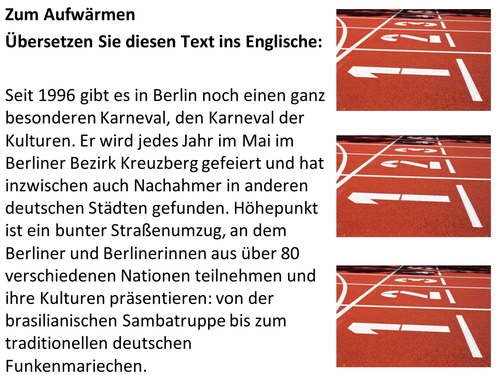



 The questions „woher?“ and „wohin?“ ask about direction.
They can be written together or separate.
„Wohin gehst du?“ – „Wo gehst du hin?“
„Woher kommst du?“ – „Wo kommst du her?“
The questions „woher?“ and „wohin?“ ask about direction.
They can be written together or separate.
„Wohin gehst du?“ – „Wo gehst du hin?“
„Woher kommst du?“ – „Wo kommst du her?“
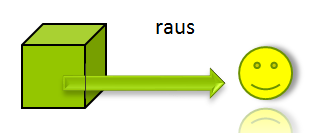
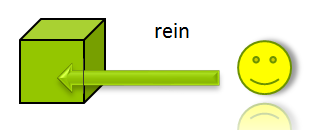 rein = hinein / herein
rein = hinein / herein
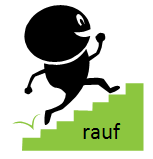 rauf = hinauf / herauf
rauf = hinauf / herauf
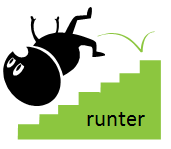

 What are German indefinite pronouns?
These are pronouns that do not indicate the gender or number of things/people discussed. To put it simply, they are those vague words like ‘somebody’, ‘everybody’, ‘a few’, and ‘some’. Why are these important to learn? Because sometimes we aren’t able to be – or don’t want to be – too specific!
(Note some of the words’ endings here might change in real speech, according to the gender of the subject. But the main thing at this stage is that you get a feel for how these words look and sound. ? )
So how do we say these indefinite pronouns in German?
Everybody – Alle/Jeder
All of us – Allesamt
Somebody – Jemand/Irgendwer
Nobody – Niemand/Keiner
Anybody – Jedermann/Irgendjemand
Something – (Irgend)Etwas
Somewhere – Irgendwo
Nowhere – Nirgends/Nirgendwo
Both – Beide
Some/a few – Einige
A lot/many – Viel(e)
Those two/three/four – Diese zwei/drei/vier
Any – Irgendwelche(s)
A bit – Ein bisschen
A little – Ein wenig
One/You (eg. ‘One can do this’) – Man
Several – Mehrere
Such/of the like – Solche
Take a look at some of the above words in action:
Niemand will heute Abend mitgehen ———– Nobody wants to go this evening.
Einige von uns gehen ins Kino ——- A few of us are going to the cinema.
Beide sehen gut aus ———- Both look good.
Mehrere von uns wollen mitgehen ———– Several of us want to go.
Alle hier sind verrückt ————– Everyone here is crazy.
Irgendetwas stimmt nicht ———— Something is not right.
Jemand muss mir helfen ———— Someone needs to help me.
Solche Sachen sind hier verboten ———- Such things are forbidden here.
Man muss das Fenster aufmachen ———- One/you must open the window.
Sie ist heute ein bisschen langsam ———— She’s a bit slow today.
Ein wenig Butter und dann stimmt’s ———– A little butter and then it‘s perfect.
Ich gehe nirgendwo hin ———- I’m going nowhere.
Ich brauche irgendwelche Gedichte für meine Hausaufgaben ——– I need any/some sort of poems for my homework.
Es steckt irgendwo im Schrank ———— It’s somewhere in the wardrobe.
I hope this post has been helpful. Any questions, let us know in the comments!
Constanze
What does the German word “irgendwie” mean?
4 Answers
Will McChesney
Will McChesney, bilingual American English/German, by design
Updated Feb 9 2015
In colloquial speech, a great idiomatic translation is often “kinda.”
Ich war halt irgendwie müde, und hatte keine Lust auszugehen.
I was just kinda tired, and didn’t feel like going out.
Es ist mir dann halt irgendwie eingefallen, und ich wusste, was ich tun musste.Then it just kinda came to me, and I knew what I had to do.
Then, as other posters have noted, a common literal translation is “somehow.”
Wir müssen es irgendwie doch schaffen.
We’ll have to get it done somehow.
Bonus! A similar Füllwort (filler word) to irgendwie is quasi. It is also often idiomatically translated as “kinda” or “sorta.”
Dann haben wir Angela Merkel gesehen! Als Bundeskanzlerin ist sie quasi der „Obama von Deutschland“.
Then we saw Angela Merkel! As chancellor, she’s kinda like the “Obama of Germany.”
» Übersetzung(en) tabellarisch anzeigen | immer
» Übersetzungen mit gleichem Wortanfang
» irgend | irgendwann
SYNO eines Tages | früher oder später …
irgendwann
anytime {adv}
sometime {adv}
eventually {adv}
somewhen {adv} [some time] [rare, perceived as archaic or non-standard unless used as a stylistic device, esp. in combination with “somewhere” etc.]
any time {adv}
one day or other {adv}
one of these days {adv}
at one time or another {adv}
at some time or another {adv}
by and by {adv} [old-fashioned]
somewhere along the line {adv} [coll.] [at some time]
irgendwann [in der Zukunft]
some day {adv}
irgendwann einmal
sometime {adv}
irgendwann einmal [früher einmal]
once upon a time {adv}
(früher) irgendwann mal
at some point (in the past) {adv}
irgendwann (mal / einmal)
at some point
Alles rächt sich irgendwann.
What goes around, comes around.proverb
irgendwann in der Zukunft
one day {adv}
(at) some point down the line {adj}
Alles was du besitzt, besitzt irgendwann dich.
The things you own, they end up owning you. [Fight Club]quote
Ich würde gern irgendwann mal Weihnachten Skifahren gehen. [ugs.]
I’d like to go skiing one Christmas.
Vielleicht komme ich irgendwann darauf zurück.
I may take you up on it some time.idiom
Was du Anderen Gutes tust, kommt irgendwann zu dir zurück.
What goes around, comes around.idiom
Wir wurden durch das Fernsehen aufgezogen in dem Glauben, dass wir alle irgendwann mal Millionäre werden, Filmgötter, Rockstars … Werden wir aber nicht!
We were raised to believe that someday we were all gonna be millionaires or movie stars or rock stars. But we’re not. [Fight Club]quote
Irgendwann in Mexico
Once Upon a Time in Mexico [Robert Rodriguez]Ffilm
» Übersetzung(en) tabellarisch anzeigen | immer
» Übersetzungen mit gleichem Wortanfang
» irgend | irgendwann
SYNO eines Tages | früher oder später …
irgendwann
anytime {adv}
sometime {adv}
eventually {adv}
somewhen {adv} [some time] [rare, perceived as archaic or non-standard unless used as a stylistic device, esp. in combination with “somewhere” etc.]
any time {adv}
one day or other {adv}
one of these days {adv}
at one time or another {adv}
at some time or another {adv}
by and by {adv} [old-fashioned]
somewhere along the line {adv} [coll.] [at some time]
irgendwann [in der Zukunft]
some day {adv}
irgendwann einmal
sometime {adv}
irgendwann einmal [früher einmal]
once upon a time {adv}
(früher) irgendwann mal
at some point (in the past) {adv}
irgendwann (mal / einmal)
at some point
Alles rächt sich irgendwann.
What goes around, comes around.proverb
irgendwann in der Zukunft
one day {adv}
(at) some point down the line {adj}
Alles was du besitzt, besitzt irgendwann dich.
The things you own, they end up owning you. [Fight Club]quote
Ich würde gern irgendwann mal Weihnachten Skifahren gehen.
I’d like to go skiing one Christmas.
Vielleicht komme ich irgendwann darauf zurück.
I may take you up on it some time.idiom
Was du Anderen Gutes tust, kommt irgendwann zu dir zurück.
What goes around, comes around.idiom
Wir wurden durch das Fernsehen aufgezogen in dem Glauben, dass wir alle irgendwann mal Millionäre werden, Filmgötter, Rockstars … Werden wir aber nicht!
We were raised to believe that someday we were all gonna be millionaires or movie stars or rock stars. But we’re not. [Fight Club]quote
Irgendwann in Mexico
Once Upon a Time in Mexico]]>
What are German indefinite pronouns?
These are pronouns that do not indicate the gender or number of things/people discussed. To put it simply, they are those vague words like ‘somebody’, ‘everybody’, ‘a few’, and ‘some’. Why are these important to learn? Because sometimes we aren’t able to be – or don’t want to be – too specific!
(Note some of the words’ endings here might change in real speech, according to the gender of the subject. But the main thing at this stage is that you get a feel for how these words look and sound. ? )
So how do we say these indefinite pronouns in German?
Everybody – Alle/Jeder
All of us – Allesamt
Somebody – Jemand/Irgendwer
Nobody – Niemand/Keiner
Anybody – Jedermann/Irgendjemand
Something – (Irgend)Etwas
Somewhere – Irgendwo
Nowhere – Nirgends/Nirgendwo
Both – Beide
Some/a few – Einige
A lot/many – Viel(e)
Those two/three/four – Diese zwei/drei/vier
Any – Irgendwelche(s)
A bit – Ein bisschen
A little – Ein wenig
One/You (eg. ‘One can do this’) – Man
Several – Mehrere
Such/of the like – Solche
Take a look at some of the above words in action:
Niemand will heute Abend mitgehen ———– Nobody wants to go this evening.
Einige von uns gehen ins Kino ——- A few of us are going to the cinema.
Beide sehen gut aus ———- Both look good.
Mehrere von uns wollen mitgehen ———– Several of us want to go.
Alle hier sind verrückt ————– Everyone here is crazy.
Irgendetwas stimmt nicht ———— Something is not right.
Jemand muss mir helfen ———— Someone needs to help me.
Solche Sachen sind hier verboten ———- Such things are forbidden here.
Man muss das Fenster aufmachen ———- One/you must open the window.
Sie ist heute ein bisschen langsam ———— She’s a bit slow today.
Ein wenig Butter und dann stimmt’s ———– A little butter and then it‘s perfect.
Ich gehe nirgendwo hin ———- I’m going nowhere.
Ich brauche irgendwelche Gedichte für meine Hausaufgaben ——– I need any/some sort of poems for my homework.
Es steckt irgendwo im Schrank ———— It’s somewhere in the wardrobe.
I hope this post has been helpful. Any questions, let us know in the comments!
Constanze
What does the German word “irgendwie” mean?
4 Answers
Will McChesney
Will McChesney, bilingual American English/German, by design
Updated Feb 9 2015
In colloquial speech, a great idiomatic translation is often “kinda.”
Ich war halt irgendwie müde, und hatte keine Lust auszugehen.
I was just kinda tired, and didn’t feel like going out.
Es ist mir dann halt irgendwie eingefallen, und ich wusste, was ich tun musste.Then it just kinda came to me, and I knew what I had to do.
Then, as other posters have noted, a common literal translation is “somehow.”
Wir müssen es irgendwie doch schaffen.
We’ll have to get it done somehow.
Bonus! A similar Füllwort (filler word) to irgendwie is quasi. It is also often idiomatically translated as “kinda” or “sorta.”
Dann haben wir Angela Merkel gesehen! Als Bundeskanzlerin ist sie quasi der „Obama von Deutschland“.
Then we saw Angela Merkel! As chancellor, she’s kinda like the “Obama of Germany.”
» Übersetzung(en) tabellarisch anzeigen | immer
» Übersetzungen mit gleichem Wortanfang
» irgend | irgendwann
SYNO eines Tages | früher oder später …
irgendwann
anytime {adv}
sometime {adv}
eventually {adv}
somewhen {adv} [some time] [rare, perceived as archaic or non-standard unless used as a stylistic device, esp. in combination with “somewhere” etc.]
any time {adv}
one day or other {adv}
one of these days {adv}
at one time or another {adv}
at some time or another {adv}
by and by {adv} [old-fashioned]
somewhere along the line {adv} [coll.] [at some time]
irgendwann [in der Zukunft]
some day {adv}
irgendwann einmal
sometime {adv}
irgendwann einmal [früher einmal]
once upon a time {adv}
(früher) irgendwann mal
at some point (in the past) {adv}
irgendwann (mal / einmal)
at some point
Alles rächt sich irgendwann.
What goes around, comes around.proverb
irgendwann in der Zukunft
one day {adv}
(at) some point down the line {adj}
Alles was du besitzt, besitzt irgendwann dich.
The things you own, they end up owning you. [Fight Club]quote
Ich würde gern irgendwann mal Weihnachten Skifahren gehen. [ugs.]
I’d like to go skiing one Christmas.
Vielleicht komme ich irgendwann darauf zurück.
I may take you up on it some time.idiom
Was du Anderen Gutes tust, kommt irgendwann zu dir zurück.
What goes around, comes around.idiom
Wir wurden durch das Fernsehen aufgezogen in dem Glauben, dass wir alle irgendwann mal Millionäre werden, Filmgötter, Rockstars … Werden wir aber nicht!
We were raised to believe that someday we were all gonna be millionaires or movie stars or rock stars. But we’re not. [Fight Club]quote
Irgendwann in Mexico
Once Upon a Time in Mexico [Robert Rodriguez]Ffilm
» Übersetzung(en) tabellarisch anzeigen | immer
» Übersetzungen mit gleichem Wortanfang
» irgend | irgendwann
SYNO eines Tages | früher oder später …
irgendwann
anytime {adv}
sometime {adv}
eventually {adv}
somewhen {adv} [some time] [rare, perceived as archaic or non-standard unless used as a stylistic device, esp. in combination with “somewhere” etc.]
any time {adv}
one day or other {adv}
one of these days {adv}
at one time or another {adv}
at some time or another {adv}
by and by {adv} [old-fashioned]
somewhere along the line {adv} [coll.] [at some time]
irgendwann [in der Zukunft]
some day {adv}
irgendwann einmal
sometime {adv}
irgendwann einmal [früher einmal]
once upon a time {adv}
(früher) irgendwann mal
at some point (in the past) {adv}
irgendwann (mal / einmal)
at some point
Alles rächt sich irgendwann.
What goes around, comes around.proverb
irgendwann in der Zukunft
one day {adv}
(at) some point down the line {adj}
Alles was du besitzt, besitzt irgendwann dich.
The things you own, they end up owning you. [Fight Club]quote
Ich würde gern irgendwann mal Weihnachten Skifahren gehen.
I’d like to go skiing one Christmas.
Vielleicht komme ich irgendwann darauf zurück.
I may take you up on it some time.idiom
Was du Anderen Gutes tust, kommt irgendwann zu dir zurück.
What goes around, comes around.idiom
Wir wurden durch das Fernsehen aufgezogen in dem Glauben, dass wir alle irgendwann mal Millionäre werden, Filmgötter, Rockstars … Werden wir aber nicht!
We were raised to believe that someday we were all gonna be millionaires or movie stars or rock stars. But we’re not. [Fight Club]quote
Irgendwann in Mexico
Once Upon a Time in Mexico]]>  USE of Da in German[/caption]
USE of Da in German[/caption]


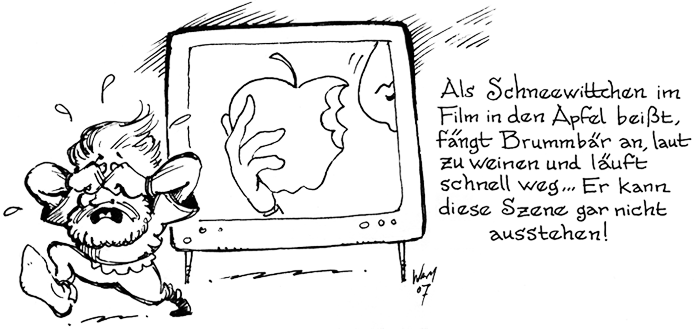
 Comparative and Superlative Adjectives in German
There are three adjective degrees in German:
Comparative and Superlative Adjectives in German
There are three adjective degrees in German:


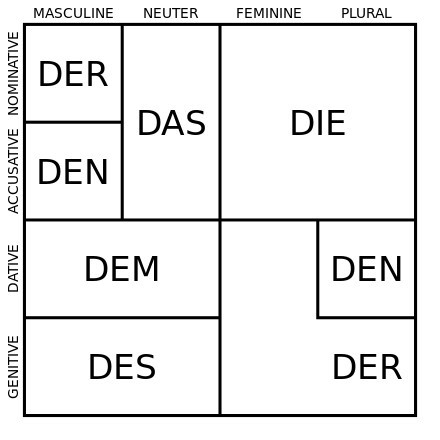
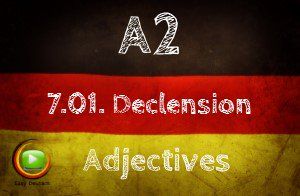 Adjective Declensions
Adjective Declensions